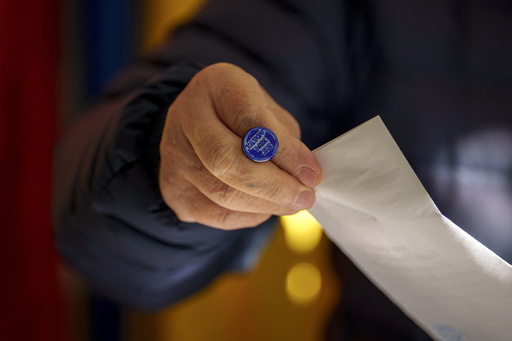
BUCHAREST, Romania — On Sunday, Romanians participated in a pivotal parliamentary election, occurring right after the first round of a highly contested presidential election. This election cycle has thrust the country into significant instability due to serious allegations of electoral misconduct and potential interference from Russia, impacting this member state of both the European Union and NATO.
The parliamentary elections will fill the 466 seats of the Romanian legislature and determine the new government and prime minister. Additionally, Romanians residing abroad began voting a day earlier, on Saturday, to ensure broader participation.
This legislative vote follows a tumultuous first round of the presidential election, where a controversial far-right populist, Calin Georgescu, garnered the highest number of votes despite initially trailing in the polls. Georgescu, who is 62 years old, is set to compete against reformist candidate Elena Lasconi of the Save Romania Union party in a runoff scheduled for December 8.
Georgescu’s surprising success has been linked to his increased prominence on TikTok, which has sparked widespread protests across Romania. Opponents of his candidacy criticize his past comments praising historical fascist figures in Romania and Russian President Vladimir Putin, viewing him as a significant threat to democratic principles.
Numerous observers interpret the outcomes of the presidential election as indicative of a profound political shift in Romania, moving away from traditional mainstream parties toward more populist and anti-establishment platforms. This shift has been partially fueled by economic factors, such as rising inflation and a declining economy, which resonate with many voters.
Alexandru Rizescu, a 24-year-old medical student, remarked on the unexpected outcome of the presidential election, suggesting it is a clear signal of a broader trend toward far-right populism in Europe. He expressed concern regarding the implications of Georgescu assuming the presidency alongside a supportive parliament, saying, “It’s going to be wild.”
According to insights from Expert Forum, a think tank based in Bucharest, Georgescu experienced a considerable surge in engagement on TikTok leading up to the vote, which seemed “sudden and artificial,” echoing his polling results. Romania’s defense officials reportedly noted that a specific candidate had garnered extensive exposure due to preferential treatment from TikTok, highlighting a potential risk of Russian influence, which Russia has denied.
In a related development, the Constitutional Court mandated a recount of the nearly 9.4 million votes following a complaint lodged by a candidate who received only 1% of the votes, alleging that the USR had flouted electoral laws on polling day. The Central Election Bureau has endorsed this request, with the court delaying a verdict on whether to annul the votes until Monday.
Cristian Andrei, a Bucharest-based political consultant, stated that the current parliamentary election could differ substantially from previous predictions due to Georgescu’s unexpected popularity, potentially leading to record support for far-right parties. “We are going to wake up in a new political reality,” he observed, indicating that Georgescu’s supporters are likely to reshape the political landscape in Romania for the foreseeable future.
Despite the historical dominance of two major opposition parties—the Social Democratic Party (PSD) and the National Liberal Party (PNL)—their coalition has shown signs of stress. Tensions intensified after a small ethnic Hungarian party withdrew from the Cabinet last year due to a power-sharing disagreement.
In Romania, while the president holds significant authority, particularly regarding national security and foreign policy issues, the prime minister is the head of the government. Current polls suggest that the leading parties in the parliamentary race include the PSD, the far-right Alliance for the Unity of Romanians, and the PNL. Having emerged on an anti-corruption platform in the last eight years, the USR’s popularity has dwindled, although it still holds potential for a noteworthy share of incoming votes.
Other minor parties may struggle to cross the 5% threshold necessary to gain representation in parliament, including the pro-European reformist REPER party and the liberal-conservative Force of the Right. Predictions exist around the far-right nationalist S.O.S Romania party and the recently established and lesser-known Party of Young People, both of which have expressed support for Georgescu, possibly gaining a foothold in the upcoming parliament.
In light of recent developments, Silviu Safta, a 30-year-old retail manager from Bucharest, noted that while Georgescu’s leading position surprised many, he remained uncertain if the parliamentary elections would reflect a similar populist trend. “I think Romanians will be more informed about their elections and their candidates,” he stated. “I’m a little bit skeptical about the results, but I hope that democracy will win.”

